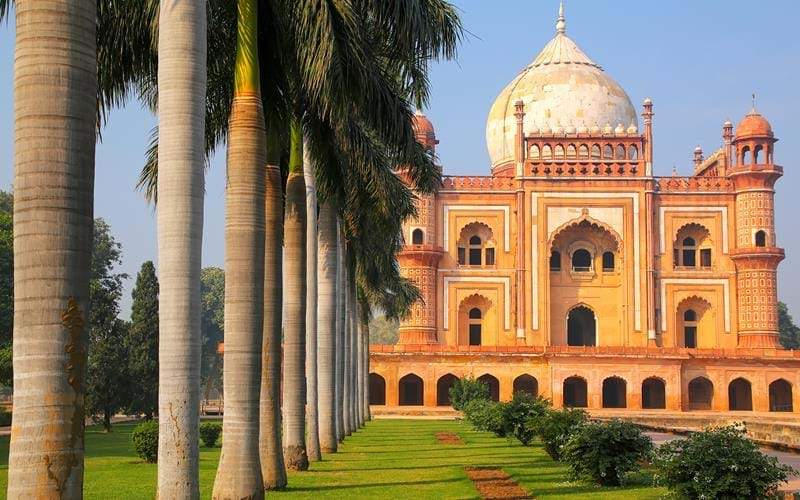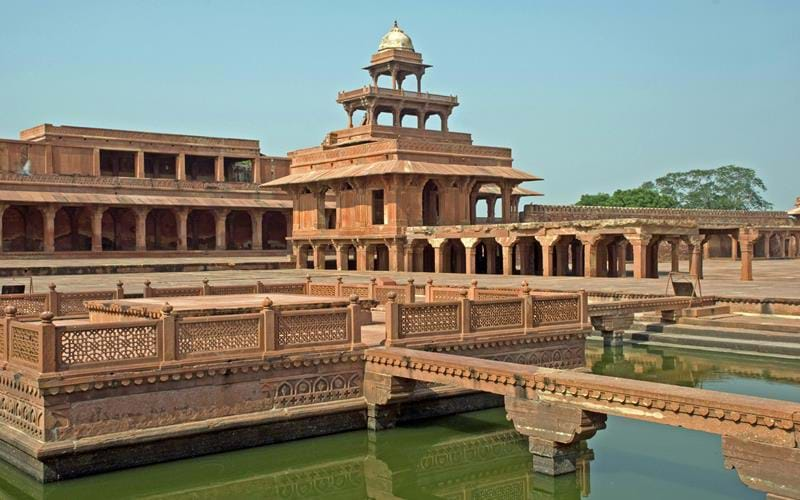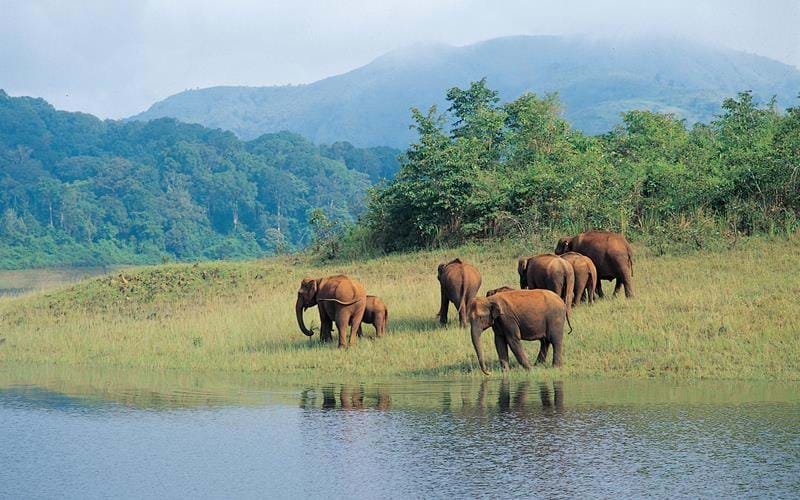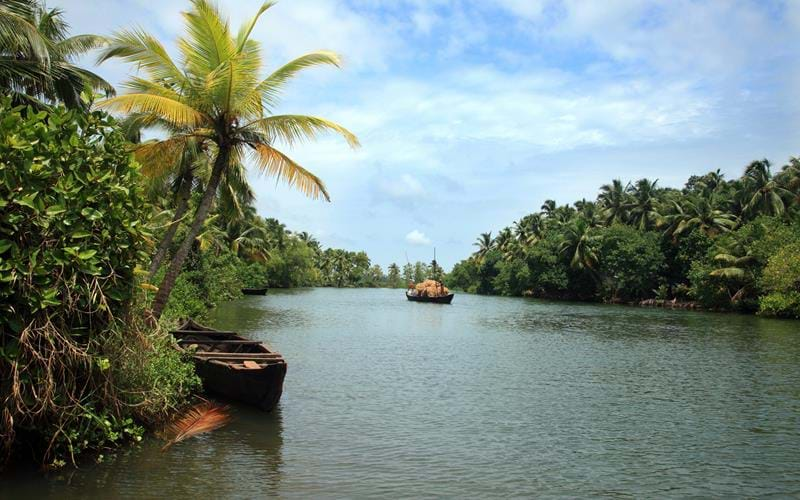TransIndus was among the first operators to offer group tours to Kerala in the early 1990s and continues to devise some of the most innovative…
View more
Offer open until 31st July 2025
One of the questions we’re most frequently asked by clients contemplating their first trip to India is ‘whether to go north or south’? This two-week group tour neatly sidesteps the dilemma by combining the highlights of both. Beginning with a whistle-stop round of the Golden Triangle and Rajasthan’s monuments – including the Taj Mahal, Delhi’s Jama Masjid and “Pink City” of Jaipur – it uses Mumbai’s ultra-efficient flight connections as a stepping stone to the far southern state of Kerala, whose lush, tropical backwaters and tea plantations provide the perfect counterpoint to the Mughal grandeur and desert vistas of the previous week. As always with TransIndus group tours, accommodation is comfortable, often in luxurious period properties where possible.
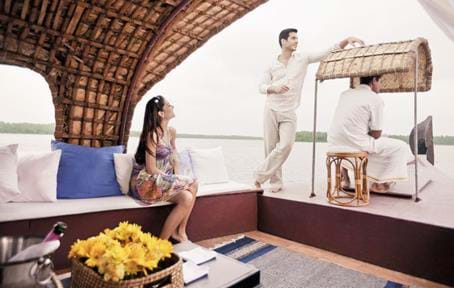
Cultural Holidays Wildlife Holidays River Cruising Holidays Luxury Train Holidays Family Holidays Honeymoons Beach Holidays Adventure Holidays
On arrival in Delhi, you’ll be met by your TransIndus team and transferred to the Suryaa hotel or similar, where you’ll be staying for two nights. Spend the remainder of the day recovering from your journey with a leisurely swim in the hotel pool, and perhaps a stroll around the local neighbourhood later. In the evening there will be a welcome dinner at a local restaurant.
Delhi, the vibrant capital of India, is steeped in a rich history spanning millennia. Its origins trace back to the ancient Indraprastha, mentioned in Hindu epics like the Mahabharata. Over centuries, Delhi evolved through various dynasties, each erecting magnificent structures like the Qutub Minar, symbolizing Islamic architecture's zenith in India.
The Mughals, starting with Babur, further embellished Delhi with grand edifices like the Red Fort and Humayun's Tomb, establishing it as a symbol of power and opulence. The city reached its zenith under Shah Jahan, who built the majestic Taj Mahal in nearby Agra.
British colonial rule marked a relatively new chapter, making Delhi the capital of British India in 1911. Post-independence, it became the seat of the Indian government in 1947, witnessing rapid modernization and urban development. Today, Delhi is a testament to India's diverse cultural heritage, blending ancient legacies with modern aspirations.
Explore Delhi today starting with Old Delhi in the morning: enjoy a cycle rickshaw ride in the bustling lanes of Chandni Chowk followed by the Jama Masjid, the largest mosque in India, and the Raj Ghat, a memorial to Mahatma Gandhi. In the afternoon, drive past Lutyen’s New Delhi and visit the tomb of Humayun and the Qutb Minar.
Cycle-rickshaws are a relaxing, and eco-friendly, way to explore the lanes of Old Delhi. Different streets are to be given over to different trades in this atmospheric district, which formed the hub of the former Mughal city. Dominating its skyline is the massive white dome of the Jama Masjid mosque, the next stop on your tour. After admiring the extraordinary view from its minarets, enjoy lunch at one of the famous kebab restaurants below, before driving past the Raj-era capital to Humayun’s Tomb, one of the India’s greatest early Mughal buildings. Older still is the iconic Qutb Minar victory tower on Delhi’s southern outskirts, the day’s final stop.
Drive to Agra (4-5 hours) for an overnight stay in the Grand Mercure or similar. In the afternoon, visit the impressive Agra Fort, a mix of Hindu and Islamic architecture followed by a visit to the ornate tomb of Itamud-ud-Daula. Finish the day with a heritage walk of Agra.
Agra’s great Mughal Fort, on the banks of the Yamuna River, was where Emperor Shah Jahan, creator of the Taj Mahal, was imprisoned at the end of his life by his rather fanatical son, Aurangzeb – the old man is said to have wiled away his days gazing at the tomb through the windows of a gilded rooftop pavilion. On the opposite bank, the exquisitely decorated Itimad-ud Daulah tomb provides the next stop on today’s tour. The mausoleum’s inlay work foreshadowed that of the Taj.
Visit the Taj Mahal at sunrise. After breakfast back at your hotel, continue to Jaipur (6-7 hours) visiting Fatehpur Sikri en route. Closer to Jaipur we stop at the impressive 9th century step well at Abhaneri. Stay at Shahpura House or similar for two nights.
Fatehpur Sikri, the former capital of Emperor Akbar, was built at lavish expense at end of the 16th century but only occupied for sixteen years, when the court decamped to Lahore. Today, the finely carved, dark-red buildings remain in fine condition and vividly evoke the opulence of the Mughal era. Among many highlights are the Diwan-i-Khas audience hall, with its richly sculpted throne pillar, the beautiful Tomb of Sheikh Salim Chishti (a revered Sufi mystic) and Buland Darwaza gateway.
Today’s other sightseeing stop, the famous Chand Baori stepwell, lies just off the main Agra–Jaipur highway at Abhaneri. Its ornately modelled steps provide a fine photo opportunity, and a welcome chance to stretch your legs!
Visit the 17th century hilltop fort of Amber and the sparkling Mirror Palace. In the afternoon visit the City Palace complex including its museum and the 18th century Jantar Mantar astronomical observatory. Drive through the busy bazaars for a photo stop at the Hawa Mahal Palace, one of Jaipur iconic locations.
Perched on the rim of a dramatic escarpment, Amber Fort retains some of the finest interiors surviving from the 16th and 17th centuries in India, notably a glittering ‘Hall of Mirrors’, or ‘Sheesh Mahal’, lined with intricate mirror mosaics where the Maharaja and his consorts would enjoy music and poetry recitals. Anyone interested in traditional Rajasthani textiles will also enjoy a visit to the Anokhi Museum of Hand Printing, located in a beautifully restored haveli in Amber village.
Jaipur itself is a swirl of life and colour, and its numerous monuments and markets provide the focus for the rest of the day. You’ll begin at the famous City Palace complex, which includes the much photographed ‘Hawa Mahal’, or ‘Palace of Winds’, a five-storey façade of elaborately screened windows from where the women of the royal household used to watch processions in the streets below.
Take an early morning flight to Mumbai and transfer to The Leela Mumbai or similar for an overnight stay. This afternoon visit the Gateway of India. Drive past Mumbai High Court and the ornate Victoria Terminus. Drive along the Marine drive and visit the Hanging Gardens, offering a splendid view of the city.
The logical place to start any round of Mumbai’s sights is the Gateway of India, the city’s own Arc de Triomphe. Designed in the hybrid, typically colonial ‘Indo-Sarcenic’ style, it was conceived as a ceremonial arrival point for royalty, viceroys and VIPs newly alighted at the nearby steamer jetty, though is today – ironically – best remembered for being where the last British troops garrisoned in the country slow-marched home to Blighty in 1947. The Taj Mahal Hotel still stands proudly nearby, as emblematic of the city now as it was in Victorian times. Wind up your tour with a drive around Back Bay to the Hanging Gardens of Malabar Hill for a splendid view over Marine Drive.
Take a morning flight to Cochin. Transfer to Fragrant Nature or similar for two nights.
For centuries the hub of India’s spice and tea trade, Fort Cochin occupies the northern tip of a peninsula dividing the mouth of the Vembanad Lake from the Arabian Sea. Its low-rise, red-tiled skyline bears the imprint of its former colonial residents: Lusitanian chapels, Jewish synagogues, Dutch burghers’ houses, Armenian mansions, and British bungalows and godowns (warehouses) all survive in the Fort’s grid of narrow lanes – the largest collection of early colonial buildings in Asia.
Visitors can savour the atmosphere of bygone eras by staying in one of the beautiful heritage hotels that have opened around the waterfront. Watch the container ships, oil tankers and local fishing boats chug past the famous Chinese fishing nets over a gin and tonic on your own verandah, then dine on spicy Keralan coastal cuisine in some of South India’s finest restaurants.
Spend the morning taking in the sights of historic Fort Cochin. Explore the colonial street and St. Francis, the oldest church in India. Visit the Dutch Palace, with its murals of the Ramayana. In the evening, enjoy a sunset cruise on the harbour, a signature Kerala experience, for views of the landmark Chinese fishing nets, which provide a spectacular photo opportunity at dusk.
Your guided tour of the city’s chief landmarks takes in the beautiful Dutch Palace in Matancherry, famed for its traditional Keralan murals, followed by a visit to the old Synagogue in nearby Jew Town. This district holds several huge, and very well stocked, antiques emporia that are well worth a browse. In the evening, the group will be driven up to Fort Cochin for a sunset cruise around the harbour, where you’ll see the iconic Chinese fishing nets in action, along with a variety of craft, both large and small, from dugout fishing canoes to giant container ships.
Drive along meandering roads through lush, green countryside ascending into the ‘Western Ghats’ at Periyar (5 hours). Enjoy lunch at a rubber plantation. Stay at the Cardamom County Resort or similar for two nights. In the evening attend a Kathakali performance, a traditional dance drama in which the dancers wear elaborate costumes and make up.
The mountains of inland Kerala, which run the entire length of the state, are one of the world’s biodiversity hotspots. Tea, coffee and spice plantations dominate many areas, but abundant forest also survives, and the Periyar Wildlife Sanctuary encompasses one of the most readily accessible of these. Centred on a flooded valley system, the park is among the largest in India, famous first and foremost for its herds of wild elephant, which congregate in the dry season around the shores of Periyar Lake.
In the morning, take a walk in Periyar Nature Reserve with tribal trackers, in search of wildlife. In the afternoon visit a spice plantation which offers an interesting insight into how various spices such as cardamom, cloves and cinnamon are grown, cultivated and processed.
Boat safaris on Periyar Lake are fun, but too noisy for serious wildlife spotting. A better option is to take to the footpaths in the company of a local guide, who can track and identify the many creatures who live in this well-preserved tract of forest. Malabar giant squirrels, palm civets and sambar deer are commonly encountered, as are hornbills and other spectacular birds. Elephants may be sighted around the water’s edge and are best viewed from the safety of a boat or safari raft.
Drive back down through the hills and plantations towards the backwaters to board a rice boat for an overnight cruise through Lake Vembanad and the backwaters. This is a region that not only shelters some unique animal and bird life, but also lush paddy fields. This is one of the few places in the world where farming is done below sea level.
Up until the 1980s, large barges made of oiled jackwood and canopies of plaited palm leaves were used throughout the Kuttinad region to transport rice and other produce through the backwaters. Now, trucks do the haulage work, but the boats – known as kettu vallam in Malayali – take visitors on cruises around the canals, rivers and lagoons of this fascinating region, where most of the population still live in island villages. A far cry from the oily craft of old, kettu vallam are today fitted with comfortable en-suite, air-con bedrooms, galleys, and viewing decks from which you’ll be able to watch the watery world slip past. Four-course meals of delicious Keralan curries are served by liveried staff in the evening.
Disembark from the riceboat and transfer to Mararikulam. Stay at Abad Turtle Beach Resort or similar hotel for two nights.
On this penultimate day of the tour, you’ll be free to enjoy the beach and hotel facilities at your own pace. A number of optional excursions are on offer.
Time to bid farewell to India as you transfer to the airport for your onward journey.
✓ 13 nights accommodation
✓ Arrival & departure transfers. Internal travel by road and rail
✓ English-speaking guides. Accompanying tour escort when minimum group size achieved
✓ Breakfast daily. Lunch on days 2, 4, 5, 8, 9, 11. Dinner on days 1, 11
✓ Entrance fees at monuments. Escorted walks in Periyar

Stay for an additional three nights at the Travancore Heritage Hotel.
Transfer to Trivandrum airport for your onward flight.
| DEPARTURE DATE | PRICE PER PERSON | SINGLE ROOM supplement | AVAILABILITY | |
| Thu 16 Oct 2025 | £2475 | £1155 | Limited | |
| Sun 09 Nov 2025 | £2375 | £1155 | Good | |
| Sun 23 Nov 2025 | £2375 | £1155 | Good | |
| Sun 07 Dec 2025 | £2375 | £1155 | Good | |
| Sun 18 Jan 2026 | £2375 | £1155 | Good | |
| Sun 08 Feb 2026 | £2375 | £1155 | Good | |
| Sun 22 Feb 2026 | £2375 | £1155 | Good | |
| Sun 15 Mar 2026 | £2375 | £1155 | Good | |
| Sun 05 Apr 2026 | £2285 | £1065 | Good | |
| Sun 19 Apr 2026 | £2195 | £995 | Good |
With the Summer almost upon us, now is the time to begin planning your next summer adventures in Asia. Our Travel Specialists are ready to take your call and discuss the adventure you have been dreaming of.
Or call us on 0208 566 3739

